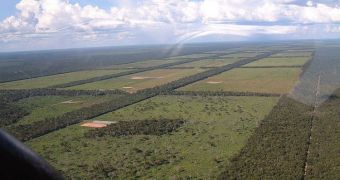Throughout large parts of West Africa, rainforests are being cut down for a variety of reasons, primarily to make way for crops or grazing animals. However, this phenomenon is causing surviving rainforests to receive only about half of the usual amount of rain.
Details of the study appear in a paper entitled “How does local tropical deforestation affect rainfall,” which is published in the latest issue of the esteemed scientific journal Geophysical Research Letters.
The work was carried out by University of Leeds investigators L Garcia-Carreras and Douglas J Parker, who are also the authors of the research paper. The experts explain that surface temperature shifts are causing disturbances in the way rain clouds usually form above those regions.
Land areas that are used for crops or grazing animals tend to be warmer than surrounding, forested land, a phenomenon that contributes to the temperature anomalies affecting the weather. Researchers now hope to be able to introduce this knowledge in future policies.
Based on the new data, it may become possible for authorities to make better land management-related decisions in other regions of the globe as well, such as for example in the massive, yet-endangered rainforests of the Amazon. There too, deforestation runs rampant.
“We already know from satellite observations that changes in land use can have a big impact on local weather patterns. Here we have been able to show why this happens,” explains Dr. Luis Garcia-Carreras, who is based at the Leeds School of Earth and Environment.
“Our findings suggest that it's not just the number of trees removed that threatens the stability of the world's rainforests, the pattern of deforestation is also important,” adds the scientist, who was also the lead author of the paper.
“African rainforests already have the lowest rainfall of any rainforest ecosystem on Earth, which could make them particularly sensitive to changes in local weather patterns,” he goes on to say.
Rainforests must be protected at all costs, climate scientists around the world argue. In addition to providing copious amounts of vitally-important oxygen, they are also trapping vast amounts of greenhouse gases such as carbon dioxide, which have been proven to drive global warming.
“Therefore if rainfall is reduced even further as a result of deforestation, it could threaten the survival of the remaining forest by increasing the trees' sensitivity to drought,” further damaging the ecosystem, Garcia-Carreras concludes.

 14 DAY TRIAL //
14 DAY TRIAL //